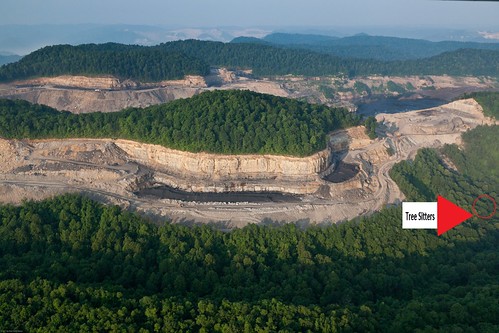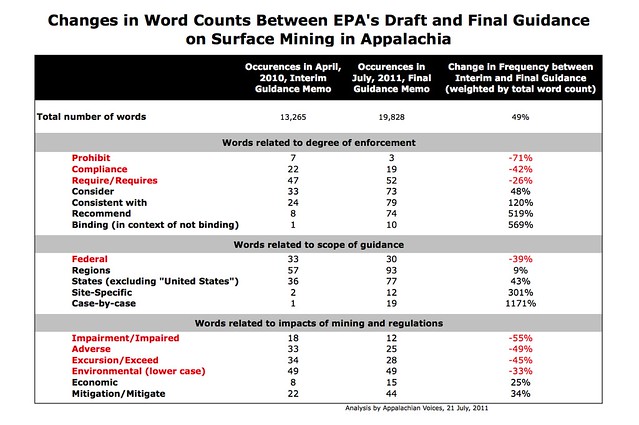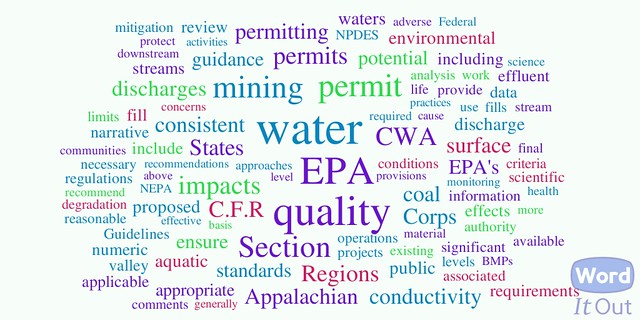Archive for July, 2011
Breaking: Tree Sit on Coal River Mountain Haults Blasting
Press Release from RAMPS
MARFORK, W.Va. – Two protesters associated with the RAMPS Campaign halted blasting on a portion of Alpha Natural Resources’ Bee Tree mountaintop removal mine on Coal River Mountain today by ascending two trees. Catherine-Ann MacDougal, 24, and Becks Kolins, 21, are on platforms approximately 80 feet off the ground within 300 feet of active blasting on the mine. The banners hanging from their platforms read “Stop Strip Mining” and “For Judy Bonds” in honor of strip mining activist Julia “Judy” Bonds of Packsville, W.Va. who died of cancer earlier this year. The activists demand that Alpha Natural Resources stop strip mining on Coal River Mountain and that the West Virginia Department of Environmental Protection prohibit future strip mining in the Coal River Watershed.“I feel, with the keen urgency of extinction, that Alpha Natural Resources cannot be allowed to tear apart Coal River Mountain and allow all those living below it to suffer for their profits. The Coal River watershed cannot tolerate any more damage. There is no way that I can begin to detail the comprehensive destruction that surface mining and mountaintop removal wreak on the forest ecosystem of the southern Appalachian mountains,” said Catherine-Ann MacDougal.
Coal River Mountain is the last major intact mountain in the watershed, which encompasses roughly 570,000 acres in the heart of the southern WV coalfields. Nearly a quarter of total land area in the watershed is being mined or permitted to be mined in the future, including over 5,000 acres of Coal River Mountain. As of January 2011, Marfork Coal Company, a subsidiary of Alpha, has destroyed about 75 acres of Coal River Mountain on the Bee Tree permit, the only active mountaintop removal permit on the mountain. Activists say they are determined to prevent further strip-mining.
Elias Schewel, 27, and Junior Walk, 21, are supporting the sitters from the base of their trees. Walk, who grew up in Eunice W.Va. at the foot of Coal River Mountain says that he was inspired to take action, in part, by his lifelong relationship with Judy Bonds.
“The last two families to be driven out of this holler we’re in today were Judy Bonds and my great uncle and they both died of lung cancer. Judy spoke often about how hard it was to leave, but black water spill after black water spill, the blasting dust clouds, and fears for the health of her family forced her out. Packsville is gone. We’re not just losing our clean air and clean water. We’re losing our communities, our history, and our culture.”
Judy Bonds’ fears of the health impacts from coal operations have been increasingly backed up by research from WVU. A recent public health study found a correlation between residence in a mountaintop removal area and higher rates of birth defects, even accounting for other socio-economic factors(i). Public health research has linked residence in coal-impacted regions to increased rates of cancer, kidney disease, and some chronic illnesses, confirming long-held community concerns.(ii)(iii)
“Those who are drinking tainted water, breathing coal dust, and watching the mountains fall around them don’t need a scientific study to tell them what’s wrong,” noted MacDougal. Fellow tree sitter Becks Kolins remembers their first visit to the home of a Coal River Valley resident last year.
“He showed me his yearbook and pointed out everyone that had gotten cancer. The only teachers that hadn’t gotten cancer had made a point of not drinking the water.”
Lisa Henderson, Judy Bonds’ daughter and Coal River Valley resident, sees this action as a continuation of her mother’s work.
“I hope that today’s actions serve as a symbol that the struggle to live peacefully and pollution-free in the Coal River Valley did not end when my mother’s life did. My mother and I often compared the fight to survive here on Coal River to the civil rights struggles of the 1960s. I am sure that generations from now, our children will look back on this movement also and the actions of the people involved, and ask the question of their elders, ‘Whose side were you on?'”
RAMPS (Radical Action for Mountain People’s Survival) is a non-violent direct action campaign based in southern West Virginia dedicated to ending all forms of strip-mining in Appalachia. Ongoing updates about this action will be available at www.rampscampaign.org
EPA Guidance Will Not Protect Appalachian Communities
After hearing that EPA Would Rely on the Best Science to Protect People from Mountaintop Removal Mining Waste, This Guidance is a Bitter Disappointment
 Today, the Environmental Protection Agency released the final draft of their long-awaited surface coal mining guidance.
Today, the Environmental Protection Agency released the final draft of their long-awaited surface coal mining guidance.
In light of new information showing a link between mountaintop removal and sickness, birth defects, and cancer clusters, this guidance falls disappointingly short of the “comprehensive” steps necessary to protect Appalachia and its people from what EPA themselves call “permanent” and “irreversible damage” from strip mines. We really, really need an EPA to protect us from a dangerous, dishonest, and often two-faced coal industry. This particular action by the EPA will not even come close to protecting citizens from the actions of these companies, or the most destructive mining practices in America.
We should take a moment to applaud EPA for taking a step in the right direction. Taking action to protect people from mountaintop removal is the right thing to do. They are certainly under seemingly unprecedented pressure from the coal lobby and their Congressional allies. For giving their time and attention to protecting citizens from mountaintop removal, we applaud and thank them.
However, there were several things EPA could have done to properly protect the environment and public health.
Firstly, this is just a guidance, which is a weak regulatory device for pursuing the regulation of deadly and dangerous practices like strip-mining. Ideally, the Administration would have fought for strong permanent protections in the form of a law, such as the bipartisan Clean Water Protection Act (HR 1375), which has over 100 cosponsors in the House, and would keep toxic mining waste out of our streams. At the very least, EPA should have gone through a formal rule-making process.
So not only is there little that is enforceable about this guidance, but in the final draft EPA actually backslides, and presents something that is even weaker than previous drafts. Of particular concern is that fact they are permitting valleyfills at all. Even worse, they went from “sequencing” valleyfills (allowing one at a time) under strict review, to allowing several at a time on particular mine sites.
My colleague Dr. Matt Wasson will have much more on this later, but its interesting to look at which words were changed in the final guidance compared to the interim version released last year.
There’s not a lot to like in that chart, but if you’re starting to worry that we’re moving backward rather than forward on mountaintop removal it might be reassuring to take a look at the word cloud from the final guidance memo released today.
Despite it’s flaws and the recent backsliding, the EPA’s guidance is a step forward in protecting Appalachian communities, streams and mountains. It’s just not a very big step, nor is it permanent. So we’ve got more work to do.
New Study Reports-Appalachian Children Are Paying The Price For Cheap Coal
Written by Erika Skaggs, Alliance for Appalachia Legislative Intern
I know this country needs electricity but if it means hurting my children then go ahead and shut mine off.
Those are the words of Paula Foley Swearingin, a native West Virginian and mother of four, describing the terrible reality of what it means to be a parent in Appalachia. Fortunately for Paula’s children they weren’t born in her hometown of Mullens, WV, because if they were, the chances of them growing up to be such beautiful, healthy, strong young men would have been substantially less.
That’s because according to the results of a new peer reviewed study by Dr. Micheal Hendryx of West Virginia University and Dr. Melissa Ahern of Washington State University, infants whose mothers live in counties where Mountaintop Removal coal mining occurs have up to a 181% greater chance of being born with a circulatory or respiratory disorder, and are 42% more likely to suffer from birth defects of any type, even after accounting for confounding factors like race, obesity and poor access to prenatal care.
To put that in perspective, the highest risk associated with cigarette smoking is a 50% increase in the likelihood of having a child with Omphalocele (being born with all or part of the intestines outside of the body), while the rates for other types of defects like clubfoot or cleft palate only go up by an average of 28%*. Just think about that for a second, simply living in a county where Mountaintop Removal occurs can put babies in three times more danger than if their mother smokes while pregnant.
Dr. Hendryx and Dr. Ahern’s study has already been covered in USA Today, Rolling Stone, The Huffington Post and dozens of other newspapers across the country, as well as countless blogs. If that pace keeps up it won’t be long until the entire country is aware of one of coals dirtiest little secrets- Mountaintop Removal kills children.
Clearly, that has put the coal industry on serious defense. Shortly after those results were published Cromwell and Moring, a Charleston based law firm representing coal interests, released this:
“The study failed to account for consanquinity [sic], one of the most prominent sources of birth defects.”
That post has since been deleted but the message made it through load and clear. The coal industry is so far out on limb that they are willing blame a major human health crisis on inbreeding, that’s right inbreeding. As if the suffering born by generations of Appalachians weren’t bad enough, the industry is now resorting to the most dehumanizing lies imaginable to convince the rest of the country that mountain people are too stupid and inbred to be worth caring about.
Clearly they are not, but this study does put people like Paula Swearingin in an unthinkable position. How does she raise her children in a place where the very air they breath and the water they drink is toxic?
Some would say “If it’s that bad, why don’t they just move?” but that response is every bit as despicable as the coal industry’s. If this were happening in the Adirondack’s or the Rocky’s no one would dream of poisoning people out of their homes for coal, but because Appalachia has been written off for generations, it’s citizens don’t seam to enjoy the same consideration or protection as the rest of us.
So what does this mean? Should we simply abandon Appalachia to the will of the coal industry as they continue to maim and kill more children, or do we stand up and say enough is enough? The answer seams clear – Our fellow Americans deserve better, and it is unacceptable for this country’s endless thirst for energy to be quenched at the expense of our most vulnerable citizens.
Stopping Mountaintop Removal: 101!
Its official! 131!
 As big coal and their allies in Congress continue to attack, undermine, and gut public health and environmental protections, Appalachian Voices, the Alliance for Appalachia, NRDC and others continue to play offense by promoting the bipartisan Clean Water Protection Act (HR 1375). This bill would make it illegal to dump toxic waste from mountaintop removal mines into our headwater streams in Appalachia.
As big coal and their allies in Congress continue to attack, undermine, and gut public health and environmental protections, Appalachian Voices, the Alliance for Appalachia, NRDC and others continue to play offense by promoting the bipartisan Clean Water Protection Act (HR 1375). This bill would make it illegal to dump toxic waste from mountaintop removal mines into our headwater streams in Appalachia.
This week HR 1375 hit 101 cosponsors, and that number is continuing to grow as more Representatives learn about the horrific impacts mountaintop removal is having on the born and the unborn in Appalachia. See if your Congressman is a cosponsor below. If they are not, take a moment and ask them to cosponsor of the Clean Water Protection Act (HR 1375).
…
(more…)
House, Once Again, Passes Attack on Water, Science, Humans
Rahall Legislates that Water Stop at State Lines. Seriously.
 Yesterday evening the House of Representatives passed The Clean Water Cooperative Federalism Act (HR 2018), a bill that turns back the clock forty years on the environmental and public health protections in the Clean Water Act. This brazen attack on public protections is the closest big industrial polluters have ever come to completely gutting laws that protect Americans’ ability to access clean water.
Yesterday evening the House of Representatives passed The Clean Water Cooperative Federalism Act (HR 2018), a bill that turns back the clock forty years on the environmental and public health protections in the Clean Water Act. This brazen attack on public protections is the closest big industrial polluters have ever come to completely gutting laws that protect Americans’ ability to access clean water.
Colorado Democratic Representative Jared Polis perhaps said it best:
“Letís not fool ourselves, the bill before us today isnít just about the role of federal government, the bill isnít just a push for state sovereignty; rather, this bill would satisfy two very niche special interests at the cost of the American public. This bill is designed to benefit mountaintop coal mining companies and large factory farms.”
Polis is, of course, absolutely right. Meanwhile, cowards like Nick Rahall keep up this charade that this is somehow about “protecting Appalachian jobs.” Inconveniently for them, there are facts. The FACTS ARE: Mining jobs in Central Appalachia have increased since the MOU because companies are doing less mountaintop removal and relying more on underground mining. Underground mining employs more people.
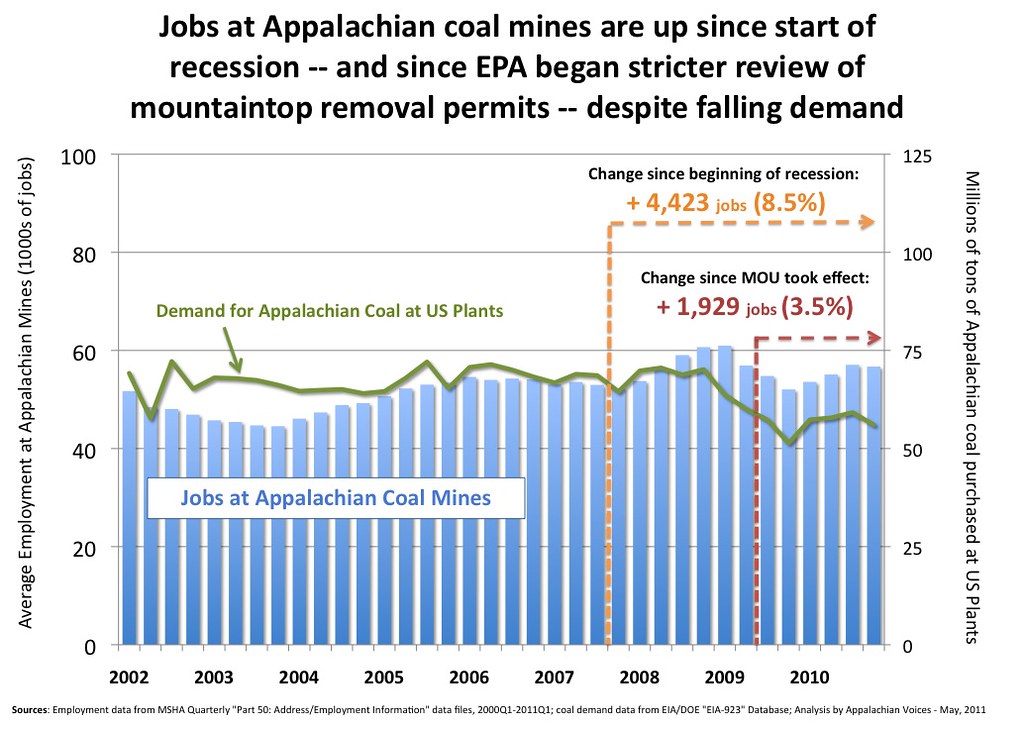
We’ve said it before, and we’ll say it again: There IS an attack on mining jobs in Central Appalachia, and its called mountaintop removal.
The Votes
There were several recorded votes. One for the final bill, once on the motion to recommit, and then 6 amendments related to protecting clean water. I’ve excluded the Capito amendment, because the politics around that will be substantially different. Most Democrats voted FOR these pro-water amendments, and most Republicans voted AGAINST these pro-water amendments. We’ll note the variation below.
Lets look at the vote on final passage first.
(HR 2018 Mica-Rahall: Clean Water Cooperative Federalism Act”)
| HR 2018 | Ayes | Nays | Not Voting | Republicans | 223 | 13 | 3 | Democrats | 16 | 171 | 5 | Total | 239 | 184 | 8 |
Ds voting Aye: Altmire, Baca, Barrow, Boren, Boswell, Cardoza, Costa, Costello, Critz, Cuellar, Holden Matheson, McIntyre, Rahall, Ross, Peterson
Rs voting Nay: Dold, Fitzpatrick, Flake, Hayworth (NY), Johnson (IL), Lance, LoBiondo, Reichert, Riggell, Smith (NJ), Wittman, Wolf, Young (FL)
For brevity’s sake (and because HTML tables take forever to make) The other amendments were Jackson-Lee (1 – 2), Carnahan, Blumenauer, Connolly, and Polis.
So, between all of these votes and the amendment votes on HR 1 earlier this year, a clearer picture is beginning to emerge of where politicians stand on protecting water quality in this country. Generally, most Democrats have voted for what we would call environmental protection. There have been 11 votes when a meaningful number of them have bucked their party and voted against protecting clean water. These are listed below. Generally, most Republicans have opposed what we would call environmental protection. There have been 8 votes when a meaningful number of them have bucked their party and voted to protect clean water. These are listed below.
*please click to “embiggen” table
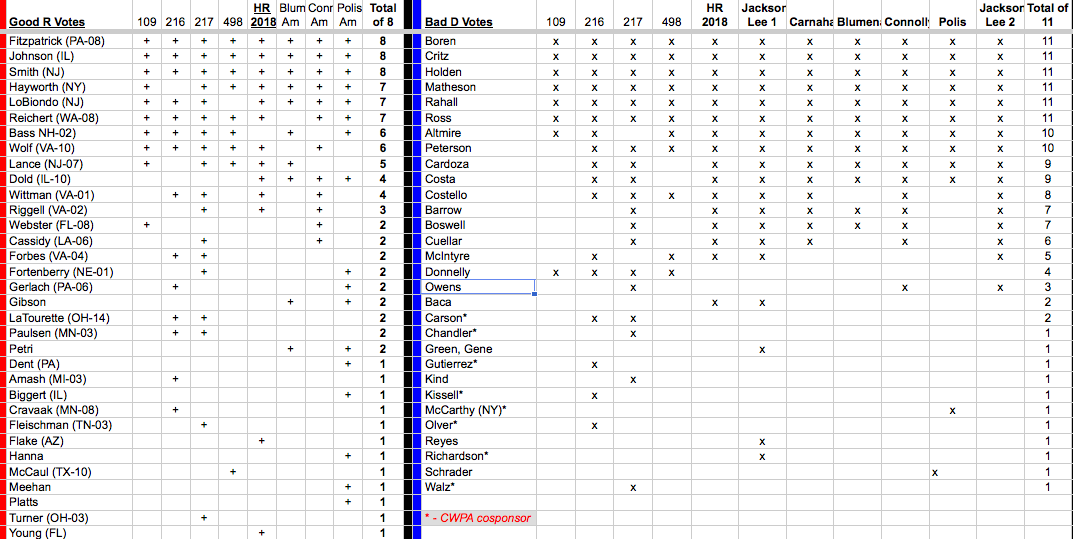
So, for instance, Republicans Chris Smith, Tim Johnson, and Mike Fitzpatrick have cast 8 of 8 “good” votes in favor of protecting clean water. Democrats Boren, Critz, Holden, Matheson, Rahall, and Ross have cast 11 of 11 “bad” votes in favor of eliminating protections for clean water.
Expect the President to Veto H.R. 2018 – Clean Water Cooperative Federalism Act
EXECUTIVE OFFICE OF THE PRESIDENT
OFFICE OF MANAGEMENT AND BUDGET
WASHINGTON, D.C. 20503
July 12, 2011
(House Rules)
STATEMENT OF ADMINISTRATION POLICY
H.R. 2018 – Clean Water Cooperative Federalism Act
(Rep. Mica, R-FL, and 39 cosponsors)
The Administration strongly opposes H.R 2018 because it would significantly undermine the Clean Water Act (CWA) and could adversely affect public health, the economy, and the environment.
Under the CWA, one of the Nationís most successful and effective environmental laws, the Federal Government acts to ensure safe levels of water quality across the country through the Environmental Protection Agency (EPA). Since the enactment of the CWA in 1972, the Federal Government has protected the waterways our citizens depend on by using its checks and balances authority to review and adjust key State water pollution control decisions, where necessary, to assure that they reflect up to date science, comply with the law, and protect downstream water users in other States. H.R. 2018 would roll back the key provisions of the CWA that have been the underpinning of 40 years of progress in making the Nationís waters fishable, swimmable, and drinkable.
H.R. 2018 could limit efforts to safeguard communities by removing the Federal Governmentís authority to take action when State water quality standards are not protective of public health. In addition, it would restrict EPAís authority to take action when it finds that a Stateís CWA permit or permit program is inadequate and would shorten EPAís review and collaboration with the Army Corps of Engineers on permits for dredged or fill material. All of these changes could result in adverse impacts to human health, the economy, and the environment through increased pollution and degradation of water bodies that serve as venues for recreation and tourism, and that provide drinking water sources and habitat for fish and wildlife.
H.R. 2018 would disrupt the carefully constructed complementary CWA roles for EPA, the Army Corps of Engineers, and States in protecting water quality. It also could eliminate EPAís ability to protect water quality and public health in downstream States from actions in upstream States, and could increase the number of lawsuits challenging State permits. In sum, H.R. 2018 would upset the CWAís balanced approach to improve water quality across the Nation, risking the public health and economic benefits of cleaner waters.
If the President is presented with this legislation, his senior advisors would recommend that he veto the bill.
* * * * * * *
Congress Declares War on Water
The following email was sent to the 50,000+ supporters of iLoveMountains.org. To sign up to receive free email alerts, click here.
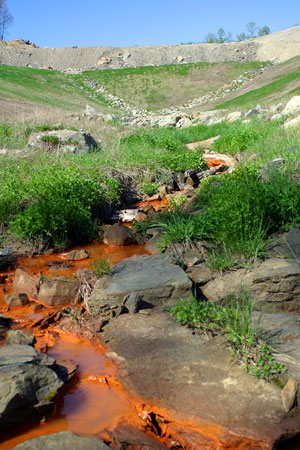 Time and time again in the 112th Congress, we have seen attacks on federal regulations of mountaintop removal coal mining through our clean water laws. This week, the Clean Water Cooperative Federalism Act (HR 2018) will come to a vote in the US House of Representatives.
Time and time again in the 112th Congress, we have seen attacks on federal regulations of mountaintop removal coal mining through our clean water laws. This week, the Clean Water Cooperative Federalism Act (HR 2018) will come to a vote in the US House of Representatives.
Tell your congressperson that HR 2018 is an attack on Appalachia, the environment, and human health:
http://ilovemountains.org/war-on-water
This bill would essentially roll back 40 years of protection established by the Clean Water Act, including provisions that grant the EPA the authority to regulate mountaintop removal coal mining. It would turn all of that power over to state agencies that are beholden to the powerful coal industry.
We cannot stand by and let this attack on your clean water go unnoticed. Contact your member of Congress today:
http://ilovemountains.org/war-on-water
While we realize we face an up hill battle in the House, we need to let it be known that we will not stand aside and allow continued destruction of the communities, land and water of Appalachia.
This is a fight we can absolutely win, and we expect this bill to be defeated in the Senate. But in order to do so, we need to demonstrate our opposition to this bill in the House.
Please take action today and ask your friends and family to do the same.
For the mountains,
Matt Wasson
iLoveMountains.org
1,000 Rednecks Marched on Blair Mountain!
The following email was sent to the 51,000+ supporters of iLoveMountains.org. To sign up to receive free email alerts, click here.
Just a few weeks ago citizens of Blair, WV climbed to the crest of Blair Mountain with over 1,000 new allies. Movement leaders from surrounding states, union workers, students, archaeologists, activists, and friends from neighboring counties and across the country all came together for Appalachia Rising: March on Blair Mountain.
This rally, this stand, was the culmination of a week long march to save the historic Blair Mountain, end mountaintop removal, strengthen labor rights, and demand sustainable jobs for all of central Appalachia. Click here to see footage of the march!
300 marched the 50 miles through the 100 degree heat to meet another 700 on top of Blair Mountain. Thousands joined us for a virtual march online, and across the nation, people heard our stories from over 300 articles covering the march.
We are proud to have been a part of this historic event with you, it would have not been possible without the growing grassroots presence around the US supporting these efforts. See the video here.
This week opens new doors in Blair and new doors for our movement. We have shown that we can struggle through intimidation, we can forge new alliances, we can overcome obstacles and that we will be stronger in the end.
Let’s move forward together! More details on the event and what’s next for Blair can be found at iLoveMountains.org/Blair-Mountain and MarchOnBlairMountain.org.
Thank you for your continued dedication: what we accomplished with the March on Blair is representative of what we are doing throughout the entire region impacted by mountaintop removal, and we couldn’t do that without you!
For the mountains,
Matt Wasson
iLoveMountains.org









